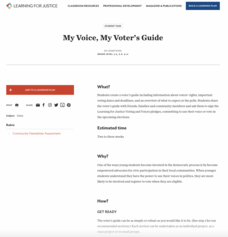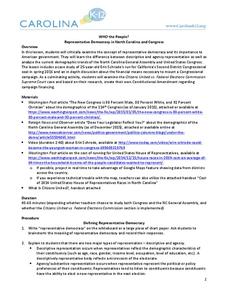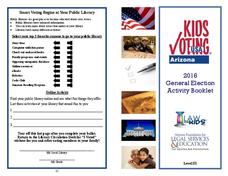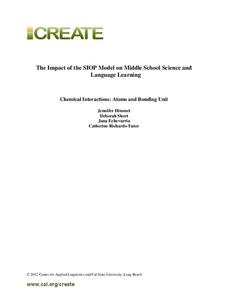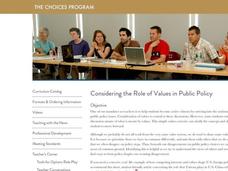Constitutional Rights Foundation
Slavery and the Electoral College
How did slavery mold the creation of the US Constitution? The final lesson in the series focuses on how slavery impacted the creation of the Electoral College. Academics learn how the Electoral College was created because Southern states...
Constitutional Rights Foundation
270 Votes to Win: The Electoral College in the United States
What exactly is the Electoral College and how does it work? The lesson is part of a larger series on government that explains what the Electoral College is and how it helps determine an election winner. Academics participate in...
Teaching Tolerance
Voting in Your Town
A socially important resource focuses on voter turnout and roadblocks to voting. Scholars review resources on voting stats, watch a documentary, and participate in group discussion regarding voting in their local communities. Academics...
Teaching Tolerance
My Voice, My Voter's Guide
Class members may be too young to vote, but that doesn't mean their voices are silent! After researching key information, such as policies for registering to what to expect at the polls, young scholars create and present election guides...
Curated OER
Election of 1864
An interesting lesson plan uses a hands-on-activity and group discussion to explore the 1864 presidential election and Lincoln's plans for ending the Civil War. Designed for high school, the resource also requires historians to...
iCivics
Mini-Lesson: Gerrymandering
Who determines the structure of voting districts? The concept of gerrymandering brings to light the ongoing issue of how those running for office gain votes. Hands-on activities enable scholars to analyze the re-drawing of voting...
iCivics
Mini-Lesson: The Incumbent Advantage
Does the person running for re-election have an advantage over the challenger? Scholars explore the concept of incumbent advantage during elections using an informative mini-lesson explaining the legislative branch. In pairs, they...
iCivics
Mini-Lesson: Midterm Elections
Find out the differences between presidential and midterm elections with an informative resource. Pupils discuss the importance of midterms to the presidency and how midterms affect the balance of government branches. They also fill out...
Constitutional Rights Foundation
The Election of 1912
The Election of 1912: an election with four competitive opponents. Pupils get to know the candidates with informative reading passages that provide context to the election. Then, the class engages in a debate and answers questions as one...
Facing History and Ourselves
Laws and the National Community
When it comes to the law, is justice always served? Teach scholars about how law sometimes enables prejudice of entire groups of people with a unit on World War II that includes a warm-up activity, analysis of primary sources,...
Carolina K-12
Making First Vote Your Vote: Designing a Schoolwide Election
Encourage pupils to design an election plan for the entire school. They participate in a Board of Elections, create polling rules, discuss election controversies, write questions about the issues, run the election through an online...
C-SPAN
Student Symposium and Resulting Action
Your class may not be able to vote yet, but that doesn't mean they can't feel like they're part of the presidential election! The resource creates a symposium where pupils debate about a selected topic in current events during an...
CK-12 Foundation
Complement Rule for Probability: Changes in an Election
Pupils determine the probability of one mayoral candidate winning given the other's chance. The interactive provides a circle graph to help visualize each candidate's percentages of winning.
Carolina K-12
How Do I Pre-Register and Vote in North Carolina?
This practical activity helps young citizens learn about pre-registration to vote in elections, discuss the merits and flaws of the pre-registration process, and register themselves. The concluding activity has young voters creating an...
Carolina K-12
The Results are In! Examining Our First Vote Election
The 2016 election is over, and now it's time to dig in to some data! An activity revolves around data gathered from the First Vote Project in North Carolina wherein thousands of students voted. After diving in to the data using provided...
Carolina K-12
Who the People? Representative Democracy in North Carolina and Congress
Our elected officials are supposed to represent us, but what does it mean when they aren't like us? Budding citizens explore the demographic makeup of the US Congress, the role of money in political elections, and the Citizens United...
Carolina K-12
Propaganda, Spin and Soundbite Politics
It's all about the spin! In an introduction to propaganda techniques and soundbite politics, scholars first learn about common propaganda techniques before seeing them in action in the context of the 2016 election cycle. Activities...
Carolina K-12
Get Out the Vote!
What better way to have a class learn about get out the vote campaigns than by having them create one themselves? After introducing get out the vote efforts and why they exist through videos, articles, and discussion questions, the...
Law for Kids
General Election Activity Booklet
It's never too early to practice smart voting! Gain practice voting in a general election using a booklet compiled of an assortment of activities including a word search, maze, graphing, and more!
Center for Applied Linguistics
Chemical Interactions: Atoms and Bonding
Watch budding chemists interact with the resource on chemical interactions. In the unit, six lessons provide an overview of basic chemistry, from understanding the development of atomic theory to distinguishing between ionic and covalent...
Brown University
Considering the Role of Values in Public Policy
Strong opinions come from deeply held values. Young citizens explore the values that are most important to them in a class discussion and activity. As they prioritize a list of values cards that include freedom, justice, and democracy,...
Brown University
The Candidates and Their Values: Election 2016
Voting for the next president of the United States is about finding the candidate who most closely aligns with your own values and sense of democracy. High schoolers become acquainted with the candidates from the 2016 election with a...
C-SPAN
The Electoral College and the Constitution
What is the purpose of the Electoral College? Is it antiquated, or does it have a place in today's political climate? High schoolers view a series of video clips as they analyze the parts of the United States Constitution that address...
C-SPAN
Electoral College Pros/Cons and Alternatives
If every vote counts, why do we need the electoral college? Middle and high schoolers study the Constitutional precedent of the electoral college, as well as its place in historical and modern elections, with an engaging social studies...





